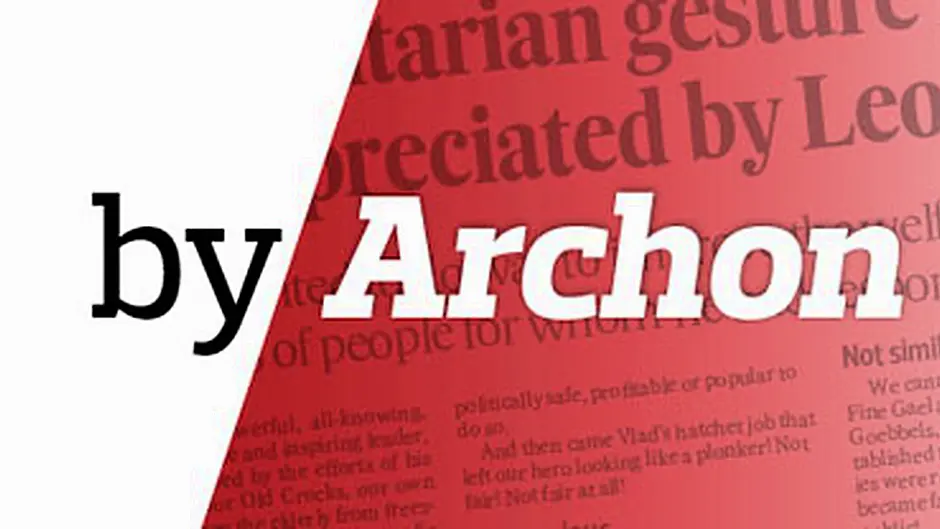Just how re-assured should we feel that Garda-led intelligence-gathering is accurate and that we are safe from terrorist threats?
AN Assistant Garda Commissioner dealing with Security and Intelligence, Michael O’Sullivan, last week assured us all that the Jihadist threat to Irish life and limb had receded.
Here’s what he said: ‘Following terror attacks in Paris and Brussels in 2015 the threat from Islamic terrorism in this country was raised from “low” to “moderate”, but in Ireland we are at the ‘at the lower end of moderate threat stage and the gardaí are considering changing that threat level back to low.’
His comments were based on the recommendations of a Garda outfit with the charming James Bond moniker of ‘National Surveillance Unit and Counter Terrorism International,’ the NSUCTI (pity they couldn’t invent something more catchy!)
He also said that while it is always difficult to estimate the number of full-time jihadists assembling bombs (in their underpants, presumably) less than 50 people were ‘of interest to the NSUCTI’ and, of those, none were suspected of planning an attack in this country. This was most reassuring.
Nonetheless, we sincerely hope his intelligence-gathering was spot-on and that the small number of Irish citizens – around 40 – who travelled to the Middle East to support Isis were rounded up on returning, expertly interrogated and released only when it was established they were not a threat to man or beast. Oh, and that his Special Branch people – or whatever they’re now called – continue to keep an eye on them, just in case.
Under control?
As the count stands, 16 of the 40 Irish religious loonies who fought for the Lost Cause in the Middle East are never coming back; they’re dead. This includes a Dublin convert to Islam who was ‘liquidated’ by Iraqi forces as he was planting a bomb.
Three remain in Syria, and five ‘baten birds’ got the all-clear, having been ‘debriefed’ (is that the word?) and agreeing that never again would they pose a threat to anybody because of religion.
In other words, the Islamic bacillus that infected young Irish Muslims seems to be under control, but for how long is the key question. The great threat is Saudi Arabia, which maintains a strong link to UK extremism, dragging young people, including immature Irish fools, into a web of fanatical religious beliefs.
Last year, a British foreign affairs think tank, the Henry Jackson Society, warned of the connection between Islamist organisations in receipt of overseas funds and Jihadist groups promoting violence. It called for a public inquiry into the role of Saudi Arabia in supporting mosques and Islamic educational institutions which have played host to extremist preachers. The report alleged that the Saudis were promoting an ‘illiberal, bigoted Wahhabi ideology.’
The European Parliament also issued a report claiming that Wahhabi and Salafi groups are involved, via Saudi charities, in the support and supply of arms to rebel groups around the world.
Salafist threat
Germany also warned of the growing threat from Saudi-style Salafism which, the German Federal Agency for Civic Education said, was in conflict with the minimal foundations of a democratic and open society.
Salafists, the Germans argued, call for the death penalty for ‘apostasy’ and is in conflict with freedom of religion. The practice of separating people into ‘true believers’ and ‘false believers’ means people are treated unequally on religious grounds while the call for a religious state in the form of a caliphate implies that Salafists reject the rule of law and the sovereignty of the people. And, needless to say, the Salafist view on gender and society leads to discrimination and the subjugation of women.
But, let’s never forget that so potent and appealing was pernicious Salafist nonsense that it brainwashed young Irish Muslims and encouraged them to head for the Middle East and participate in ‘a holy war’. The survivors returned with their tails between their legs, having witnessed at first hand the impact of obscene fundamentalism, the barbarity of mass shootings, beheadings, crucifixions and the practice of burying people alive.
Let’s not forget, either, that when the uprisings in Libya and Syria kicked off in 2013, a well-placed gentleman at the Islamic Cultural Centre in Clonskeagh disgustingly compared the youngsters and young men going off to fight for Islam to the soldiers of the International Brigade during the Spanish Civil War. ‘They see it (the Islamic war) as a battle against injustice that transcends nationality,’ he said.
Not a target?
The prospect of ‘martyrdom’ was a strong inducement, said the well-placed gent. ‘Many of them, before they leave, ask for prayers. They want to be martyred because they understand that, in Islam, martyrdom is the way to eternal life.’
Interesting, too, was the arrest in Eastern Syria last January of an Irish citizen suspected of fighting for ISIS. The so-called ‘fighter’ originally moved to Ireland in 2000 and became an Irish citizen in 2010. Consequently, if freed, he has a legal right to return to Ireland.
However, as far as is known, it is not the intention of Jihadist suspects living in Ireland to carry out terror attacks on this country. They prefer to provide false identification papers, raise money for militaristic groups abroad, or recruit for ‘specialist’ attacks in Europe.
Twenty suspected jihadists have been arrested in this country since 2015 in relation to financing terrorism.
In 2017, it was established that one of the three men behind the London Bridge atrocity had lived in Ireland, but had no links to ISIS while here.
Nevertheless, reports indicate that three people were picked up for suspected Jihadist activities in Ireland in 2017, compared to one in 2016. In all, fewer than 50 individuals are being watched for any connection to Salafi Jihadism and, according to sources, none is suspected of planning an attack here.
Lisa Smith case
And then there’s the tragic case of Lisa Smith, a member of the Air Corps for 10 years and an outstanding soldier of the 27th infantry battalion for her tip-top sniper skills. Up to recently, she was abandoned in a Syrian refugee camp with her baby daughter, and she claims she never fought for Islamic State. (However, she may have been among those who escaped from the camp at the weekend after it came under attack from Turkish warplanes).
Problem is she went voluntarily with her fella to Jihadist-occupied Syria. Gardaí say she was not radicalised in Ireland and did not pose a threat when she was a member of the Defence Forces. Security chief, Michael O’Sullivan maintains that although diplomatic efforts had been taking place to get Ms Smith and her daughter home, an assessment would have to be made on whether she was a security danger.
Certainly, Shaykh Umar al Qadri of the Sunni Muslim community believes she could be a threat. While admitting that, eventually, she should be allowed back, he recently said ‘the safety of the larger society should first be prioritised.’ He wants an investigation into her activities with ISIS, and would like the gardaí to have the assistance of international agencies with experience of questioning radicalised people.
That makes sense.








